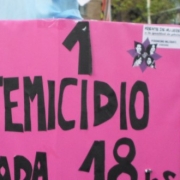#25N: Is celebrated? International Day for the Elimination of Violence against Women
As every November 25, this Monday marks the International Day for the Elimination of Violence Against Women. Date that calls us to review and rethink some data and measures taken by the last management.
“Below, we offer a google translate version of the original article in Spanish. This translation may not be accurate but serves as a general presentation of the article. For more accurate information, please switch to the Spanish version of the website. In addition, feel free to directly contact in English the person mentioned at the bottom of this article with regards to this topic”.
This date and its corresponding march close the “feminist calendar” and like every end of the year it is an opportunity to take stock, in addition to this on the occasion of the early change of government, which invites us to extend the analysis to management four years of President Mauricio Macri.
Thus, for example, at the beginning of the current month the Minister of Security Patricia Bullrich shared in her networks the data on femicides relieved by the portfolio she is in charge of, together with the phrase, in a festive tone like who celebrates an achievement, “We lower the femicides 12.1%! ” This statement, which refers to the amount of femicides of the year 2018 compared to that of 2017 (according to that information, 281 and 292, respectively), in addition to being factually incorrect, is an image of an erroneous perspective on the macho violence that explains largely the action (or lack of action) in gender policy of the outgoing government.
First, the numbers presented by Bullrich differ from those registered by the Women’s Office of the Supreme Court of Justice. According to the latter, the figures are 278 for 2018 and 273 for 2017, so it would be the opposite of the alleged reduction alleged by the minister.
According to Chequeado, the difference between the two statistics would be that in the case of the Ministry “as with other types of crimes, their figures come from police records. That is to say that it is the first post-crime analysis, before the start of the judicial investigation. ” Instead, the Women’s Office relieves information on the legal cases in process. This disparity of data should not be a problem for those corresponding to the current year, since the Supreme Court, the Ministry of Security and the Attorney General’s Office have signed an agreement to unify femicide statistics. However, we will have to wait until 2020 for the report to be published.
Meanwhile, although the official data is not possessed, the work of some feminist organizations that, as part of their militancy and without receiving any compensation, do a thorough monthly survey based on the information obtained in the media Communication. In this regard, the Mumalá National Observatory has registered 226 femicides between January 1 and October 31, 2019, not counting 38 cases under investigation, which means at least one victim every 32 hours. Broken down, this number includes 192 direct femicides, 18 linked and 6 trans / transvestites. Another relevant indicator is that 68% of the murders were perpetrated by either the couple (40%) or the former partner (28%) of the victims. Considering that 18% of them had made prior complaints, the question that arises immediately after reading these data is where the State is and what is the true scope of the policies that it has been implementing regarding gender violence.




